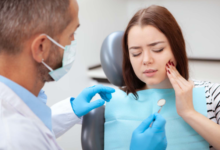Top Orthodontic Treatment Options for Adults

Orthodontic treatment is no longer just for teenagers. An increasing number of adults are seeking orthodontic care to improve their dental health and enhance their smiles. Thanks to advancements in dental technology, adults now have access to a variety of orthodontic treatment options that are effective, discreet, and tailored to fit their lifestyles. Whether you’re looking to correct misaligned teeth, fix a bite issue, or simply achieve a straighter smile, there are several top orthodontic treatments available for adults. This article explores these options, highlighting their benefits and helping you make an informed decision about which treatment might be right for you.
Traditional Metal Braces
Traditional metal braces are the most common and well-known orthodontic treatment. They have been used for decades to correct a wide range of dental issues, from crooked teeth to severe bite problems. Metal braces consist of metal brackets that are attached to the teeth and connected by a wire. The orthodontist periodically adjusts the wire to gradually move the teeth into their desired positions.
Despite the availability of newer options, metal braces remain a popular choice among adults for several reasons. They are highly effective for even the most complex cases and typically provide faster results compared to some other treatments. Additionally, modern metal braces are smaller, lighter, and more comfortable than those used in the past.
However, metal braces are also the most noticeable orthodontic option, which might be a consideration for adults concerned about aesthetics. On the upside, they are often the most affordable option and can correct a wide variety of dental issues.
Ceramic Braces
Ceramic braces are similar to traditional metal braces but with one key difference: the brackets are made of ceramic material that is either clear or tooth-colored. This makes ceramic braces less noticeable than their metal counterparts, which is a significant advantage for adults who are conscious of their appearance.
Ceramic braces are an excellent choice for adults who want the effectiveness of traditional braces but with a more discreet look. They work in the same way as metal braces, applying continuous pressure to move the teeth into alignment over time. However, they do require more care, as the ceramic brackets are more fragile and can stain if not properly maintained.
The cost of ceramic braces is generally higher than metal braces, but many adults find the aesthetic benefits worth the extra expense. They are particularly suitable for individuals with complex dental issues who want a more discreet treatment option.
Lingual Braces
Lingual braces are a less common but highly effective orthodontic treatment option for adults. Unlike traditional braces, which are placed on the front of the teeth, lingual braces are attached to the back of the teeth, making them virtually invisible from the outside. This makes them an attractive option for adults who want to straighten their teeth without the braces being visible.
Lingual braces are customized to fit the contour of each patient’s teeth, which makes them a bit more complex to install and adjust. They can be used to correct most of the same issues as traditional braces, including crowding, gaps, and bite problems.
One downside of lingual braces is that they can be more difficult to clean and may cause some initial discomfort as the tongue adjusts to the brackets. They are also typically more expensive than both traditional and ceramic braces due to the customization and placement technique. However, for adults seeking a completely hidden orthodontic solution, lingual braces are an excellent option.
Clear Aligners (Invisalign)
Clear aligners, such as Invisalign, have revolutionized orthodontic treatment, especially for adults. These aligners are made from a clear, plastic material and are custom-designed to fit snugly over the teeth. The aligners gradually shift the teeth into place and are replaced every one to two weeks as the treatment progresses.
One of the biggest advantages of clear aligners is that they are virtually invisible, making them an excellent choice for adults who want a discreet treatment option. Clear aligners are also removable, allowing patients to eat, drink, and clean their teeth without any restrictions. This convenience makes clear aligners a popular choice for adults who have busy lifestyles or professional obligations.
Clear aligners are suitable for treating a variety of orthodontic issues, including mild to moderate cases of crowding, spacing, and bite problems. However, they may not be the best option for severe or complex cases, where traditional braces might be more effective.
The cost of clear aligners is typically higher than traditional braces, but many adults find the comfort and convenience worth the investment. It’s important to note that success with clear aligners depends heavily on patient compliance—since the aligners must be worn for 20 to 22 hours a day for the best results.
Self-Ligating Braces
Self-ligating braces are similar to traditional metal or ceramic braces but with a unique twist. Instead of using elastic bands to hold the wire in place, self-ligating braces use a specialized clip or bracket system. This allows the wire to move more freely, which can result in fewer adjustments, shorter treatment times, and less discomfort.
Self-ligating braces come in both metal and ceramic options, allowing for some level of discretion. They are effective for treating a wide range of orthodontic issues, including crowding, spacing, and bite alignment.
For adults seeking a treatment that combines the effectiveness of traditional braces with the convenience of fewer appointments, self-ligating braces can be a great choice. They are generally priced similarly to traditional braces, with the added benefit of potentially faster treatment.
Retainers and Other Maintenance Devices
After completing orthodontic treatment, maintaining the results is crucial. Retainers are commonly used to keep the teeth in their new positions after the active phase of treatment is complete. There are several types of retainers available, including fixed retainers, which are bonded to the back of the teeth, and removable retainers, which are worn as needed.
For adults who have had orthodontic treatment in the past and experienced some shifting of their teeth, a retainer might be the only treatment needed to correct minor misalignment. Retainers are custom-made to fit the patient’s mouth and can be an effective way to maintain a straight smile long-term.
Additionally, other maintenance devices like night guards can be used for adults who grind their teeth (bruxism) or have other issues that could affect their orthodontic results.
Clear Braces
Clear braces are a hybrid between traditional braces and clear aligners. They use the same system of brackets and wires as traditional braces, but the brackets are made of a clear or tooth-colored material that blends in with the teeth. Clear braces offer a more discreet alternative to metal braces while still being effective for treating a wide range of orthodontic issues.
Clear braces are particularly popular among adults who need the comprehensive correction that braces provide but prefer a less noticeable option. They are suitable for both mild and complex orthodontic cases, making them a versatile treatment option.
The main consideration with clear braces is that, like ceramic braces, they can be more fragile than metal braces and require careful cleaning to prevent staining. However, for adults seeking a balance between effectiveness and aesthetics, clear braces are an excellent choice.
Accelerated Orthodontics
For adults who want to achieve their orthodontic goals in a shorter time frame, accelerated orthodontics might be an appealing option. This approach involves using specialized techniques to speed up the movement of teeth, often reducing treatment time by several months.
Accelerated orthodontics can be used in conjunction with traditional braces, clear aligners, or other orthodontic treatments. Methods include micro-osteoperforation, which stimulates bone remodeling, and the use of high-frequency vibration devices that enhance the effectiveness of aligners.
While accelerated orthodontics offers the advantage of faster results, it’s important to consult with an orthodontist to determine if it’s suitable for your specific case. This treatment typically involves additional procedures and costs, but for many adults, the shorter treatment duration is worth the investment.
FAQs
1. What is the best orthodontic treatment for adults?
The best treatment varies based on individual needs, dental issues, and preferences. Options include traditional braces, clear aligners, lingual braces, and ceramic braces.
2. How long does orthodontic treatment take for adults?
Treatment time can range from 6 months to 3 years, depending on the complexity of the case and the type of treatment chosen.
3. Are clear aligners as effective as braces?
Clear aligners are effective for many cases but may not be suitable for severe misalignment or complex bite issues, where traditional braces might be better.
4. Can orthodontic treatment be done at any age?
Yes, adults of all ages can benefit from orthodontic treatment, as long as their teeth and gums are healthy.
5. What are the pros and cons of lingual braces?
Pros: Lingual braces are invisible from the outside. Cons: They can be more difficult to clean, more expensive, and may cause initial tongue discomfort.
6. Do I need a retainer after orthodontic treatment?
Yes, retainers are essential to maintain the new position of your teeth after treatment is complete.
Conclusion
Adults seeking orthodontic treatment have more options than ever before, each with its own set of advantages. From traditional metal braces to innovative clear aligners and discreet lingual braces, there is a solution for everyone, regardless of their dental needs or aesthetic preferences. By understanding the various treatment options available and consulting with a qualified orthodontist, you can choose the best approach to achieve a healthy, beautiful smile that lasts a lifetime.





